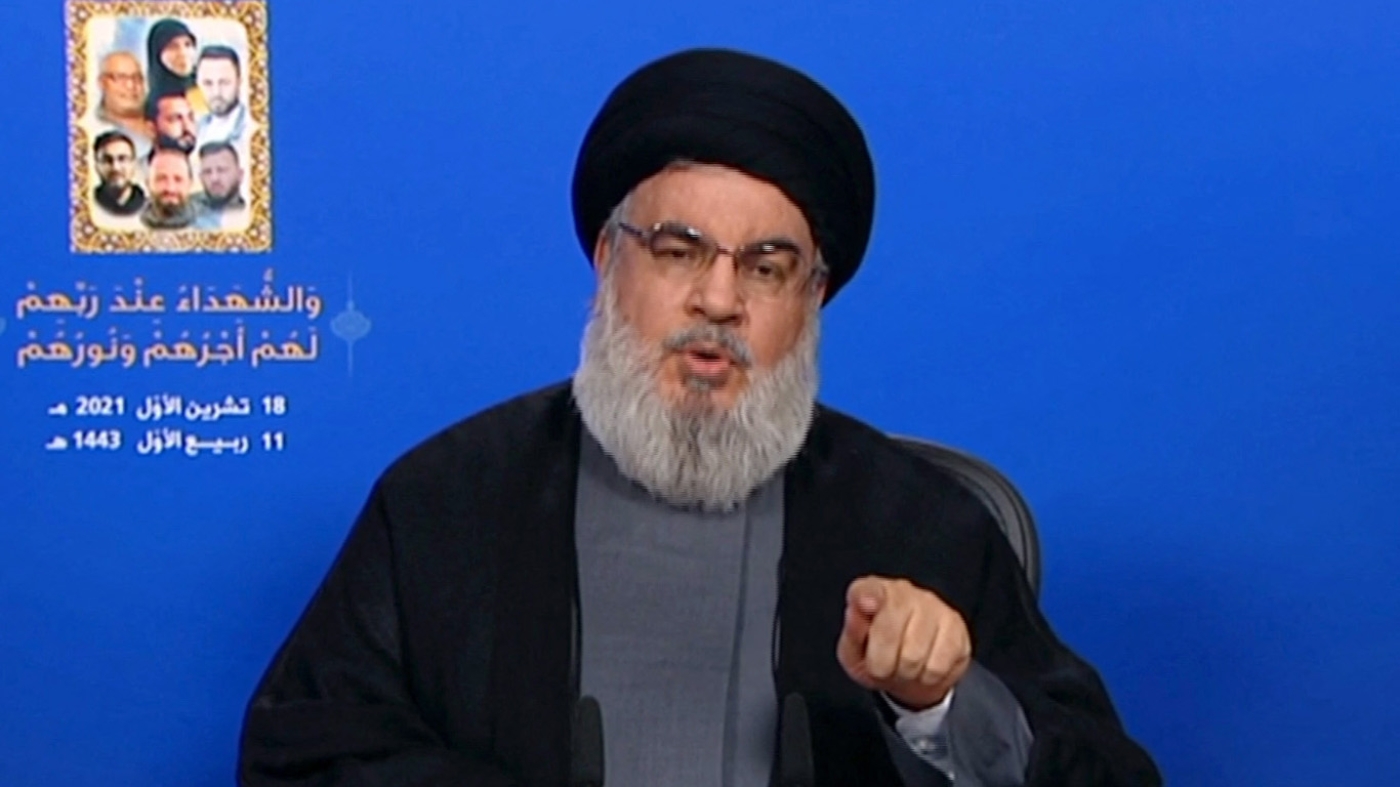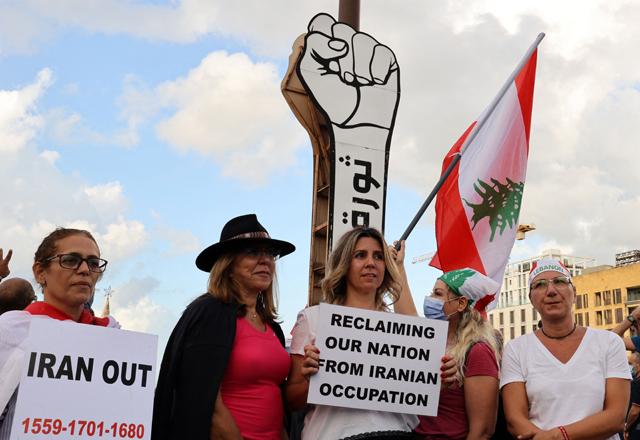
BEIRUT by Tom Perry; Editing by Giles Elgood (Reuters) - Worsening sectarian tensions in Lebanon are testing an alliance between Shi'ite Hezbollah and its Christian ally President Michel Aoun, who may lose ground to their rivals as they step up opposition to the Iran-backed group's influence. Analysts believe divisions that have deepened since an outbreak of violence in Beirut last week may play to the political advantage of Aoun's long-time Christian adversary, Samir Geagea, a Hezbollah opponent with close Saudi ties. The alliance between the heavily armed Hezbollah and Aoun has been a defining feature of Lebanese politics since 2006: Hezbollah helped Aoun become president in 2016, while Aoun has provided important Christian backing for the armed status of the group, which is more powerful than the Lebanese army. But strains have been growing, specifically over Hezbollah's opposition to the investigation into who was to blame for last year's catastrophic explosion at the Beirut port, which, while killing many Muslims, did most of its damage in Christian parts of the city.
The dilemma facing Aoun sharpened last week when tensions over the investigation ignited Beirut's deadliest street violence in years, reviving memories of the 1975-90 civil war. All of the seven dead were Shi'ites, killed in what Hezbollah has called an ambush by the Lebanese Forces, a Christian party led by Geagea. The LF denies this and blames the other side for provoking trouble by sending supporters into the Christian neighbourhood of Ain al-Remmaneh where it says four residents were wounded before a shot was fired. The violence began as supporters of Hezbollah and its Shi'ite ally, Amal, began gathering for a protest to demand the removal of Judge Tarek Bitar, who is investigating the blast that killed more than 200 people. "Today, you have Christians rejecting these scenes of getting back to civil war memories, and at the same time not happy with the way Shia are expressing their opposition to the Judge Bitar process," said a source familiar with thinking in the Free Patriotic Movement, the party founded by Aoun.
The FPM and Hezbollah had not decided to part ways, but the course of events was separating them, the source said. FPM officials did not immediately respond to a request for comment. In his first speech since the violence, Hezbollah leader Sayyed Hassan Nasrallah said the Lebanese Forces saw itself as the protector of Christian blood but Hezbollah was no enemy of Christians. read more Nasrallah said the LF had opposed his party's understanding with the FPM when it was concluded in 2006 because it did not want Christians and Muslims "to open up to each other". There was no immediate LF response to Nasrallah's remarks.

BEIRUT, (Reuters) - Lebanon's top Christian cleric, Bechara Boutros Al-Rai, said on Sunday that the judiciary should be free of political interference and sectarian "activism" amid tensions over a probe into last year's blast at Beirut port. The Maronite patriarch also said it was unacceptable for anyone to resort to threats or violence. In Lebanon's worst street violence in over a decade, seven people were shot dead last week as protesters headed to a rally opposing the inquiry. "We must free the judiciary from political interference, sectarian and partisan political activism and respect its independence according to the principle of separation of powers," he said in his sermon. Rai has an influential role as leader of the biggest Christian community in Lebanon, where political power is divided between the main Christian, Muslim and Druze sects.
The inquiry into the Aug. 4, 2020 explosion, which killed more than 200 people and devastated swathes of Beirut, has made little headway amid pushback from political factions. Hezbollah chief Hassan Nasrallah has called Judge Tarek Bitar -- the lead investigator -- biased and politicised. read more "The rise in doubts over the (integrity of the) judiciary that has been going for a while has not only undermined the judiciary but also the reputation of Lebanon," said Rai. Seven Shi'ite Muslims were shot dead on Thursday as crowds headed for a protest against Bitar called by the Iranian-backed Shi'ite Hezbollah group and its Shi'ite ally Amal. The violence added to fears for the stability of a country that is awash with weapons and suffering an economic meltdown. "What happened last week reminds the Lebanese of the start of the cursed civil war and they are not ready to relive it again," Greek Orthodox Archbishop Elias Audi said in a Sunday sermon, local media reported.

Protesters gather in front of the ‘Revolution fist’, symbol of Lebanon’s October 2019 uprising, during a rally in the capital Beirut’s Martyrs Square, on Sunday (AFP photo)


by AFP -- BEIRUT — Lebanon marked the second anniversary of its defunct protest movement with a low-key demonstration in Beirut on Sunday, while many stayed away amid grinding economic woes and deadly tensions over a port blast probe. Dozens marched under rain clouds towards Martyrs’ Square in central Beirut, an AFP photographer said. Mass protests bringing together Lebanese from all backgrounds erupted on October 17, 2019, denouncing deteriorating living conditions as well as alleged official graft and mismanagement, after the government announced a plan to tax phone calls made over messaging service WhatsApp. Cross-sectarian demonstrations swept the country, demanding the overthrow of political barons in power since at least the end of the 1975-1990 civil war.
Two years on, Lebanon is mired in a ballooning financial crisis compounded by the coronavirus pandemic, and battered by a devastating explosion at Beirut’s port on August 4 last year. Draconian banking restrictions have prevented many Lebanese from accessing their savings, while the local currency has lost more than 90 per cent of its value to the dollar on the black market. Almost 80 per cent of the population live in poverty, struggling to put food on the table amid endless price hikes, fuel shortages and power cuts. Protester Rabih Zein said it was not just previous police crackdowns that had kept demonstrators away on Sunday. “If anyone is wondering why there are not many people, it’s because they’ve deprived us of petrol, electricity and the money we put in banks,” he said. Each person marching represented many more who were forced to stay at home, Zein claimed. “Today is a symbolic stand. God willing, we will move towards change at the parliamentary elections” next spring, said the 37-year-old television producer from the northern city of Tripoli. The protest movement has given birth to a flurry of new political groups, which many hope will run in the upcoming polls.
Khazen History


Historical Feature:
Churches and Monasteries of the Khazen family

St. Anthony of Padua Church in Ballouneh
Mar Abda Church in Bakaatit Kanaan
Saint Michael Church in Bkaatouta
Saint Therese Church in Qolayaat
Saint Simeon Stylites (مار سمعان العامودي) Church In Ajaltoun
Virgin Mary Church (سيدة المعونات) in Sheilé
Assumption of Mary Church in Ballouneh
1 - The sword of the Maronite Prince
2 - LES KHAZEN CONSULS DE FRANCE
3 - LES MARONITES & LES KHAZEN
4 - LES MAAN & LES KHAZEN
5 - ORIGINE DE LA FAMILLE
Population Movements to Keserwan - The Khazens and The Maans
ما جاء عن الثورة في المقاطعة الكسروانية
ثورة أهالي كسروان على المشايخ الخوازنة وأسبابها
Origins of the "Prince of Maronite" Title
Growing diversity: the Khazin sheiks and the clergy in the first decades of the 18th century
Historical Members:
Barbar Beik El Khazen [English]
Patriach Toubia Kaiss El Khazen(Biography & Life Part1 Part2) (Arabic)
Patriach Youssef Dargham El Khazen (Cont'd)
Cheikh Bishara Jafal El Khazen
Patriarch Youssef Raji El Khazen
The Martyrs Cheikh Philippe & Cheikh Farid El Khazen
Cheikh Nawfal El Khazen (Consul De France)
Cheikh Hossun El Khazen (Consul De France)
Cheikh Abou-Nawfal El Khazen (Consul De France)
Cheikh Francis Abee Nader & his son Yousef
Cheikh Abou-Kanso El Khazen (Consul De France)
Cheikh Abou Nader El Khazen
Cheikh Chafic El Khazen
Cheikh Keserwan El Khazen
Cheikh Serhal El Khazen [English]
Cheikh Rafiq El Khazen [English]
Cheikh Hanna El Khazen
Cheikha Arzi El Khazen
Marie El Khazen